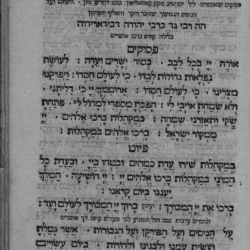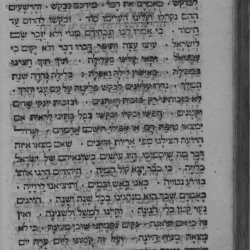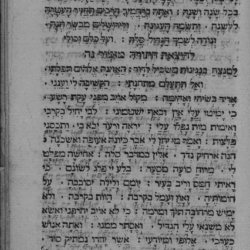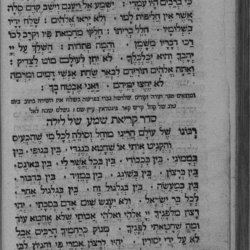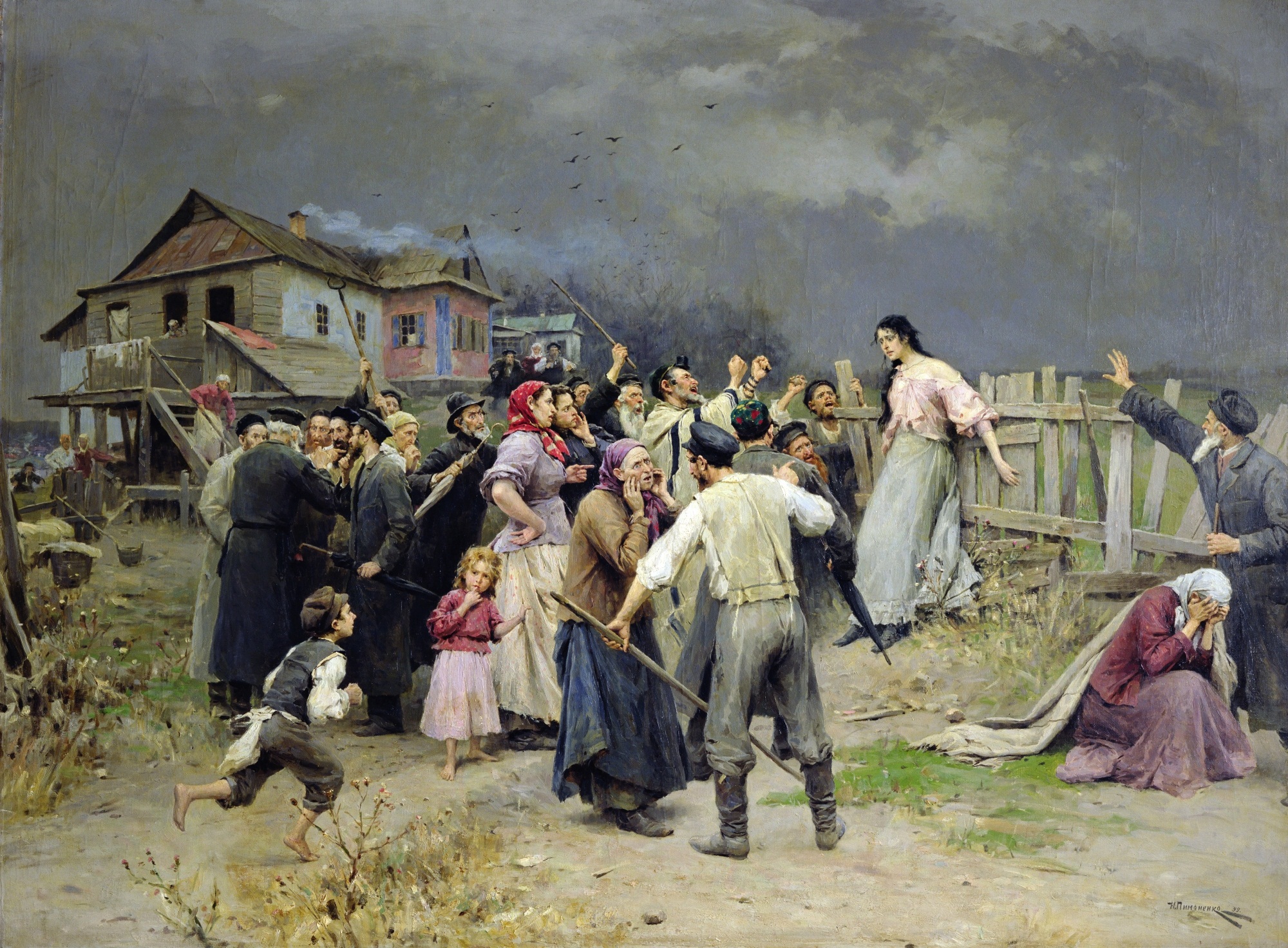Note: “The CAUSE” is used to translate the Divine Name YHVH, based on the philosophical idea of God as the Prime Mover and on the interpretation of the Name as a causative form of the copula – “causes to be.” “God” is used to translate the divine name Elohim. This translation also uses the plural pronouns They/Their/Them to refer to God as a pluralis majestatis, and to avoid the implications of God being assigned a gender. (Find Ibn Ezra’s commentary on Genesis 1:1 for a discussion of the pluralis majestatis when referring to God.) All divine referents (pronouns, epithets, names) are rendered in unicase.
| Source (Hebrew) | Translation (English) |
|---|---|
|
פסוקים שאומרים ליל יום טוב
מק״ק קאוואליאון בכ״ט לחדש סיון, והפיוט ועל הניסים הנמשך שחבר היקר והאלוף והפייטן ה״ה רבי גד ברבי יהודה דבידארידוה |
Verses recited before the festival night
of the holy community of Cavallion on 29 Sivan, and the included v-Al haNisim piyyut, composed by the great and noble poet, rabbi and teacher, Rabbi Gad son of Rabbi Yehudah de Bédarride |
|
בלילה קודם ברכו אומרים
|
At night, before Barkhu say:
|
|
פסוקים
|
Verses
|
|
אוֹדֶ֣ה יְ֭הֹוָה בְּכׇל־לֵבָ֑ב
בְּס֖וֹד יְשָׁרִ֣ים וְעֵדָֽה׃ (תהלים קיא:א) |
I thank the Cause wholeheartedly,
in the upright council and assembly. (Psalms 111:1) |
|
לְעֹ֘שֵׂ֤ה נִפְלָא֣וֹת גְּדֹל֣וֹת לְבַדּ֑וֹ
כִּ֖י לְעוֹלָ֣ם חַסְדּֽוֹ׃ (תהלים קלד:ד) |
Making great wonders alone,
for eternal is Their kindness! (Psalms 136:4) |
|
וַיִּפְרְקֵ֥נוּ מִצָּרֵ֑ינוּ
כִּ֖י לְעוֹלָ֣ם חַסְדּֽוֹ׃ (תהלים קלו:כד) |
And saved us from our stressors,
for eternal is Their kindness (Psalms 136:24) |
|
אֲרוֹמִמְךָ֣ יְ֭הֹוָה כִּ֣י דִלִּיתָ֑נִי
וְלֹֽא־שִׂמַּ֖חְתָּ אֹיְבַ֣י לִֽי׃ (תהלים ל:ב) |
I will exalt the Cause for I was low,
but my enemies did not rejoice over me. (Psalms 30:2) |
|
הָפַ֣כְתָּ מִסְפְּדִי֮ לְמָח֢וֹל לִ֥֫י
פִּתַּ֥חְתָּ שַׂקִּ֑י וַֽתְּאַזְּרֵ֥נִי שִׂמְחָֽה׃ (תהלים ל:יב) |
You turned my mourning into a dance for me,
opened my sackcloth and girded me with joy (Psalms 30:12) |
|
בְּֽ֭מַקְהֵלוֹת בָּרְכ֣וּ אֱלֹהִ֑ים
אֲ֝דֹנָ֗י מִמְּק֥וֹר יִשְׂרָאֵֽל׃ (תהלים סח:כז) |
In congregations, bless God,
the Master, from the source of Israel. (Psalms 68:27) |
|
בָּרְכוּ אֱלֹהִים בְּֽמַקְהֵלוֹת׃
|
Bless God in congregations!
|
|
פיוט
|
Piyyuṭ
|
|
בְּמַקְהֵלוֹת שִׁירוּ עֲדַת כְּמֵהִים
וּבִטְחוּ בַּיהֹוָה וּבַעֲדַת כׇּל־הֲמוֹנַי בְּמַקְהֵלוֹת בָּרְכוּ אֱלֹהִים יְהֹוָה יְהֹוָ֥ה הוֹשִׁ֑יעָה הַ֝מֶּ֗לֶךְ יַעֲנֵ֥נוּ בְיוֹם־קׇרְאֵֽנוּ׃ (תהלים כ:י) |
In congregations sing, yearning assembly,
and trust in the Cause; And in my myriad assembly, in congregations, bless God the Cause. O Cause, save! May the Sovereign answer us on the day we call. (Psalms 20:10) |
|
וגומרים ערבית כמו חול
וכמגיע לכי מעולם קוינו לך אומרים |
And finish the evening prayer as a regular weekday,
and when reading “Forever we have hoped in You”[1] In the Modim prayer, the final passage before an Al haNissim addition is inserted. say: |
|
עַל־הַנִּסִּים
וְעַל־הַפֻּרְקָן וְעַל־הַגְּבוּרוֹת. אֲשֶׁר גָּמַֽלְתָּ וְעָשִֽׂיתָ עִמָּֽנוּ וּלְבָנֵֽינוּ וּלְדוֹרוֹת׃ |
For the miracles
and for the rescue and for the mighty acts that You repaid and did for us and our children and for our descendants |
|
בְּיוֹם עֶשְׂרִים וְתִשְׁעָה לְחֹֽדֶשׁ סִיוָן
שְׁנַת חֲמֵֽשֶׁת אֲלָפִים וְאַרְבַּע מֵאוֹת וּשְׁלֹשָׁה וּשְבִיעִים. קָֽמוּ נֶגְדֵּֽנוּ עֲדַת פָּרִיצִים וּמְרֵעִים. הֶ֣בֶל הֵ֔מָּה מַעֲשֵׂ֖ה תַּעְתֻּעִ֑ים׃ (ירמיה י:טו) |
On the twenty-ninth day of the month of Sivan
in the year 5473,[2] 23 June 1713 an assembly of the corrupt and evil rose against us — worthless are they, a work of delusions! (Jeremiah 10:15) |
|
עַל־אוֹדוֹת אֲשֶׁר מָצְאוּ בְּיוֹם אֵידָם.
נַֽעַר הָרוּג בְּלִי דָּם׃ |
Regarding what they found on their iniquitous day:
a lad, killed, lacking blood. |
|
כִּמְעַט הָיָה לָֽנוּ לְמוֹקֵשׁ.
בְּאׇמְרָם אֶת־דָּמוֹ מִידֵיכֶם נְבַקֵּשׁ׃ |
It almost became a stumbling-block for us,
as they said “We seek his blood from your hands!” |
|
וְהָרְשָׁעִים הַהֵם נִקְהֲלוּ עָלֵינוּ
הֶעֱרִֽימוּ סוֹד. וּבִקְּשׁוּ לַהֲרֹס עַד־הַיְסוֹד׃ |
And these wicked ones gathered against us,
schemed secretly, and sought to destroy to the very foundation. |
|
כִּי אָמְר֗וּ לְ֭כוּ וְנַכְחִידֵ֣ם מִגּ֑וֹי
וְלֹֽא־יִזָּכֵ֖ר שֵֽׁם־יִשְׂרָאֵ֣ל (תהלים פג:ה) עֻ֥צוּ עֵצָ֖ה וְתֻפָ֑ר דַּבְּר֤וּ דָבָר֙ וְלֹ֣א יָק֔וּם כִּ֥י עִמָּ֖נוּ אֵֽל׃ (ישעיה ח:י) |
For they said “Let’s go annihilate them from nationhood,
that the name of Israel not be remembered;” (Psalms 83:5) scheme your schemes, and they will be overturned, say your piece, and it will not come about, for the Deity is with us! (Isaiah 8:10) |
|
וּבָאוּ עָלֵֽינוּ בָּעֲלִילָה.
תּוֹךְ תּוֹךְ חֲצֵרֵֽנוּ בַּמְּסִלָּה. בְּאִישׁ֥וֹן לַ֝יְלָה וַאֲפֵלָֽה: (משלי ז:ט) |
And they came against us with libel,
into our courtyards by the track, in darkest night and gloom (Proverbs 7:9) |
|
בַּלַּֽיְלָה נָדְדָה שְׁנַת הַמֶּֽלֶךְ.
נָדְדוּ עֶלְיוֹנִים לְבַקֵּשׁ פְּלֵיטָה עַל־עַם עָנִי וְהֵֽלֶךְ׃ לֹא בִּזְכוּתֵֽינוּ רַק בִּזְכוּת הָאֵתָנִים. וּבִזְכוּת יוֹנְקֵי שָׁדַֽיִם וּקְטַנִּים׃ |
In the night, sleep fled the Sovereign;[3] Find Esther 6:1. The angels begged God to save Israel from destruction.
the highest ones fled to seek rescue for the poor and wandering people. Not in our merit, only in the merit of the mighty ones,[4] A common poetic term for the patriarchs, Abraham, Isaac, and Jacob and the merit of those nursing from breasts and little ones. |
|
חָפְשׂוּ וּבִקְּרוּ וּבַקְּשׁוּ
בְּכׇל־בָּתֵּֽינוּ לִרְאוֹת אִם־יִמְצְאוּ טִפַּת דָּם. אוֹ אֲפִֽלּוּ רֹֽשֶׁם אֲדַמְדַּם׃ |
They searched[5] The root ḥpś is usually found in the pi’el, but here is found in the pa’al. This is not a typo, merely a poetic form. See Proverbs 2:4 and Proverbs 20:27, Psalms 64:7, and Lamentations 3:40 for other instances of it. and inquired and sought
in all our houses to see if they could find a drop of blood, or even a reddish stain. |
|
וְגָדוֹל הָרוֹעֶה הִצִּילָֽנוּ
מִפִּי אֲרָיוֹת וְדֻבִּים שֶׁאִם־מָצְאוּ אֵֽיזֶה דָּבָר מָה־שֶׁיִּסְמֽוֹכוּ הָיוּ עוֹשִׂים בְּשׂוֹנְאֵיהֶם שֶׁל־יִשְׂרָאֵל כְּלָיָה. כִּי כְּבָר יָצָא קוֹל הֲמָיָה. הַיְּהוּדִים הָרְגוּ אוֹתוֹ בִּזְרוֹעַ נְטוּיָה׃ בָּֽאנוּ בָּאֵשׁ וּבַמַּֽיִם וַתּוֹצִיאֵֽנוּ לָרְוָיָה׃ |
And the good Shepherd[6] While often associated with Christianity, this term is also found in the midrashic literature for God. saved us
from the mouth of lions and bears, for if they had found anything they could rely on they would have made destruction upon the enemies of Israel,[7] A euphemism for Israel itself for the mob’s voice already came out: “The Jews killed him with a strong hand!” We went through fire and water, and You brought us out to relief. |
|
בְּאׇמְרָם שֶׁכָּךְ הִיא מִנְהָגֵֽנוּ בְּכׇל־שָׁנָה וְשָׁנָה.
הוֹרְגִים נַֽעַר קָטֹן בְּלִי חֲנִינָה. וְהָיִֽינוּ לְמָשָׁל וְלִשְׁנִינָה. וְאֵין זֶה כִּי־אִם תּוֹאֲנָה. נְקֹם נִקְמָתֵֽנוּ שׁוֹכֵן מְעוֹנָה. כִּי לֹא מָצְאָה מָנֽוֹחַ הַיּוֹנָה. וְעַל־זֶה קָבַֽעְנוּ לְיוֹם צָרָה יוֹם שִׂמְחָה וְרִנָּה. שְׂפָתֵֽנוּ תַּרְנֵנָּה. שִׁירוֹת וְתִשְׁבָּחוֹת הַלֵּל וְזִמְרָה בְּלֹא תְּחִנָּה. רַק יוֹם טוֹב לְהוֹדוֹת לְהַלֵּל לְשַׁבֵּֽחַ לְפָאֵר עַל־הַנֵּס אֲשֶׁר עָשִֽׂיתָ לְעַם קְטַנֵּי אֲמָנָה. וְהָיְתָה לָֽנוּ מָגֵן וְצִנָּה. וְכָֽכָה קָבַֽעְנוּ עָלֵֽינוּ וְעַל־הַבָּאִים אַחֲרֵֽינוּ בְּכׇל־שָׁנָה וְשָׁנָה. וְתִשְׂמַח הָעֲגוּנָה. וְלִירוּשָׁלַֽיִם מְבַשֵּׂר תְּנָה׃ |
As they would say it is our custom each and every year,
killing a young lad callously, as a proverb and byword — and this is nothing but a pretext. Avenge our vengeance, Dweller on High, for the dove has not found rest! And for this we established this stressful day as a day of joy and cheer; our lips exalting songs and laudations, praise and hymn without pleas, only a holiday to thank and praise and laud and glorify for the miracle that You did to the people small in faith. And You were for us a shield and buckler, and thus we established upon us and those who come after us each and every year. Let she who is chained rejoice, and give a herald to Jerusalem! |
|
וְנוֹדֶה לְשִׁמְךָ הַגָּדוֹל
סֶֽלָה׃ |
And we will thank Your great name,
selah. |
|
ועל כולם וכולי
|
And for all this…[8] The followng line in the Modim prayer. etc.
|
|
קודם הוצאת התורה מזמור נ״ה
|
Before taking out the Torah: Psalms 55
|
|
לַמְנַצֵּ֥חַ בִּנְגִינֹ֗ת מַשְׂכִּ֥יל
לְדָוִֽד׃ |
To the conductor, arioso,
a lesson of David. |
|
הַאֲזִ֣ינָה אֱ֭לֹהִים תְּפִלָּתִ֑י
וְאַל־תִּ֝תְעַלַּ֗ם מִתְּחִנָּתִֽי׃ הַקְשִׁ֣יבָה לִּ֣י וַעֲנֵ֑נִי אָרִ֖יד בְּשִׂיחִ֣י וְאָהִֽימָה׃ מִקּ֤וֹל אוֹיֵ֗ב מִ֭פְּנֵי עָקַ֣ת רָשָׁ֑ע כִּֽי־יָמִ֥יטוּ עָלַ֥י אָ֗֝וֶן וּבְאַ֥ף יִשְׂטְמֽוּנִי׃ |
Listen, God, to my prayer;
and do not hide from my plea. Hearken to me and answer me, I am restless in my murmering and moaning at the enemy’s sound, from the wicked’s oppression, for they drop evil upon me, in rage oppose me. |
|
לִ֭בִּי יָחִ֣יל בְּקִרְבִּ֑י
וְאֵימ֥וֹת מָ֗֝וֶת נָפְל֥וּ עָלָֽי׃ יִרְאָ֣ה וָ֭רַעַד יָ֣בֹא בִ֑י וַ֝תְּכַסֵּ֗נִי פַּלָּצֽוּת׃ |
My heart trembles inside me,
and death’s terrors fall upon me. Fear and trembling come upon me, I am covered in horror. |
|
וָאֹמַ֗ר מִֽי־יִתֶּן־לִ֣י אֵ֭בֶר כַּיּוֹנָ֗ה
אָע֥וּפָה וְאֶשְׁכֹּֽנָה׃ הִ֭נֵּה אַרְחִ֣יק נְדֹ֑ד אָלִ֖ין בַּמִּדְבָּ֣ר סֶֽלָה׃ אָחִ֣ישָׁה מִפְלָ֣ט לִ֑י מֵר֖וּחַ סֹעָ֣ה מִסָּֽעַר׃ |
And I said, “Who would give me wings like a dove,
so I could fly off and shelter!? Surely I would flee far, I would dwell in the wilds — selah — I would hurry to a refuge for me, from the sweeping storming wind.” |
|
בַּלַּ֣ע אֲ֭דֹנָי פַּלַּ֣ג לְשׁוֹנָ֑ם
כִּֽי־רָאִ֨יתִי חָמָ֖ס וְרִ֣יב בָּעִֽיר׃ יוֹמָ֤ם וָלַ֗יְלָה יְסוֹבְﬞבֻ֥הָ עַל־חוֹמֹתֶ֑יהָ וְאָ֖וֶן וְעָמָ֣ל בְּקִרְבָּֽהּ׃ הַוּ֥וֹת בְּקִרְבָּ֑הּ וְֽלֹא־יָמִ֥ישׁ מֵ֝רְחֹבָ֗הּ תֹּ֣ךְ וּמִרְמָֽה׃ |
Swallow up, divide their speech, Cause;
for I see violence and strife in the city! Day and night they surround its walls, evil and toil are within it. Ruin is within it, fraud and deceit never leave its plaza. |
|
כִּ֤י לֹֽא־אוֹיֵ֥ב יְחָֽרְפֵ֗נִי
וְאֶ֫שָּׂ֥א לֹא־מְ֭שַׂנְאִי עָלַ֣י הִגְדִּ֑יל וְאֶסָּתֵ֥ר מִמֶּֽנּוּ׃ וְאַתָּ֣ה אֱנ֣וֹשׁ כְּעֶרְכִּ֑י אַ֝לּוּפִ֗י וּמְיֻדָּעִֽי׃ אֲשֶׁ֣ר יַ֭חְדָּו נַמְתִּ֣יק ס֑וֹד בְּבֵ֥ית אֱ֝לֹהִ֗ים נְהַלֵּ֥ךְ בְּרָֽגֶשׁ׃ |
As it is not an enemy that curses me —
that, I could bear — nor those who hate me powerful against me — I could hide from them — It is you, a man like me, my known companion![9] In a rare psalmodic turn, the text directly rebukes the enemy. With the context of a blood libel, this could perhaps be read as a mournful recollection of Christianity’s Jewish origin. We would sweetly counsel! In the house of God we would walk in the throng! |
|
יַשִּׁ֤י מָ֨וֶת׀ עָלֵ֗ימוֹ
יֵרְד֣וּ שְׁא֣וֹל חַיִּ֑ים כִּֽי־רָע֖וֹת בִּמְגוּרָ֣ם בְּקִרְבָּֽם׃ |
Let death be lent[10] The ketiv here is ישימות, giving “Desolation be upon them!” upon them!
Let them go down to the underworld alive, for evil is where they dwell, among them. |
|
אֲ֭נִי אֶל־אֱלֹהִ֣ים אֶקְרָ֑א
וַ֝יהֹוָ֗ה יוֹשִׁיעֵֽנִי׃ עֶ֤רֶב וָבֹ֣קֶר וְ֭צׇהֳרַיִם אָשִׂ֣יחָה וְאֶהֱמֶ֑ה וַיִּשְׁמַ֥ע קוֹלִֽי׃ פָּ֘דָ֤ה בְשָׁל֣וֹם נַ֭פְשִׁי מִקְּרׇב־לִ֑י כִּֽי־בְ֝רַבִּ֗ים הָי֥וּ עִמָּדִֽי׃ |
And I to God will call,
to the Cause who will save me. Evening and morning and noon, I would murmer and moan, and They heard my voice. They redeemed my soul from my battle, for many were with me. |
|
יִשְׁמַ֤ע ׀ אֵ֨ל ׀ וְֽיַעֲנֵם֮ וְיֹ֤שֵׁ֥ב קֶ֗דֶם סֶ֥֫לָה אֲשֶׁ֤ר אֵ֣ין חֲלִיפ֣וֹת לָ֑מוֹ
וְלֹ֖א יָרְא֣וּ אֱלֹהִֽים׃ שָׁלַ֣ח יָ֭דָיו בִּשְׁלֹמָ֗יו חִלֵּ֥ל בְּרִיתֽוֹ׃ חָלְק֤וּ ׀ מַחְמָאֹ֣ת פִּיו֮ וּֽקְﬞרָב־לִ֫בּ֥וֹ רַכּ֖וּ דְבָרָ֥יו מִשֶּׁ֗מֶן וְהֵ֣מָּה פְתִחֽוֹת׃ |
The Deity, dwelling of old — selah — who has no successor, hears and humbles
those not reverent of God. He[11] The former friend mentioned above. sent his hand against his ally, profaned his treaty; smoother than butter his mouth, while his mind[12] Literally: heart was on war; softer than oil his words, but they were curse-swords.[13] Some commentators read this word, literally “opened ones,” as “swords,” others as “curses.” I’ve included both to be safe. |
|
הַשְׁלֵ֤ךְ עַל־יְהֹוָ֨ה ׀ יְהָבְךָ֮ וְה֢וּא
יְכַ֫לְכְּלֶ֥ךָ לֹא־יִתֵּ֖ן לְעוֹלָ֥ם מ֗וֹט לַצַּדִּֽיק׃ |
Cast your burden on the Cause who will sustain you;
They will not let the righteous man ever falter. |
|
וְאַתָּ֤ה אֱלֹהִ֨ים ׀ תּוֹרִדֵ֬ם ׀ לִבְאֵ֬ר שַׁ֗חַת
אַנְשֵׁ֤י דָמִ֣ים וּ֭מִרְמָה לֹא־יֶחֱצ֣וּ יְמֵיהֶ֑ם וַ֝אֲנִ֗י אֶבְטַח־בָּֽךְ׃ |
And You, God, will bring them down to the lowest pit;
these bloody deceitful people will not live half their days, but I will trust in You. |
|
ומוציאים ספר תורה
וקורים שלושה גברי בפרשה בשלח את השירה כתוב ביום טוב של קהל קדיש קארפינטראץ׃ כהן — מה תצעק אלי לוי — נטה את ידך על הים ישראל — אז ישיר משה |
And take out the Torah scroll
and three people read from Parashat B’shallaḥ the Song written for the festival day of the holy community of Carpentras. • First ‘aliyah: Exodus 14:15–25 • Second ‘aliyah: Exodus 14:26–31 • Third ‘aliyah: Exodus 15:1–26[14] In the siddur these ‘aliyot are not listed or printed, only a note that says “see there” i.e. where they are printed for the festival day of Carpentras. |
Source(s)
Notes
| 1 | In the Modim prayer, the final passage before an Al haNissim addition is inserted. |
|---|---|
| 2 | 23 June 1713 |
| 3 | Find Esther 6:1. The angels begged God to save Israel from destruction. |
| 4 | A common poetic term for the patriarchs, Abraham, Isaac, and Jacob |
| 5 | The root ḥpś is usually found in the pi’el, but here is found in the pa’al. This is not a typo, merely a poetic form. See Proverbs 2:4 and Proverbs 20:27, Psalms 64:7, and Lamentations 3:40 for other instances of it. |
| 6 | While often associated with Christianity, this term is also found in the midrashic literature for God. |
| 7 | A euphemism for Israel itself |
| 8 | The followng line in the Modim prayer. |
| 9 | In a rare psalmodic turn, the text directly rebukes the enemy. With the context of a blood libel, this could perhaps be read as a mournful recollection of Christianity’s Jewish origin. |
| 10 | The ketiv here is ישימות, giving “Desolation be upon them!” |
| 11 | The former friend mentioned above. |
| 12 | Literally: heart |
| 13 | Some commentators read this word, literally “opened ones,” as “swords,” others as “curses.” I’ve included both to be safe. |
| 14 | In the siddur these ‘aliyot are not listed or printed, only a note that says “see there” i.e. where they are printed for the festival day of Carpentras. |
